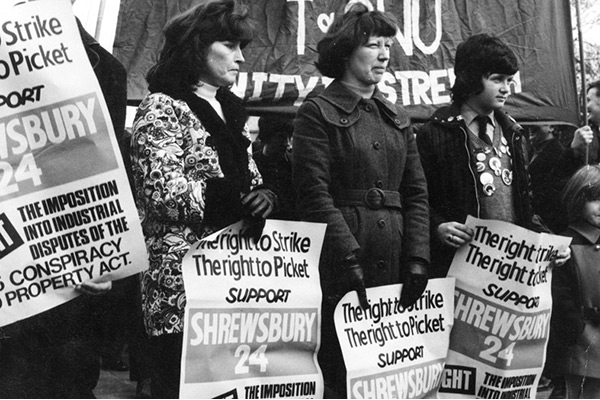Appeal judges yesterday heard allegations that a ‘covert’ government agency was involved in making a ‘deeply prejudicial’ programme broadcast during the trial of trade unionists jailed for their part in the first ever national strike in the construction industry in 1972. Lawyers representing 14 members of the so called Shrewsbury 24 argue their convictions were unsafe because of the broadcast of a documentary ‘Red Under The Bed’ which aired the day the prosecution completed giving its evidence.
As reported on the Justice Gap yesterday, the Court of Appeal will finally look at the convictions of the men who have always protested that they were victims of a political trial. Their road to the Court of Appeal has not been straightforward. The Criminal Cases Review Commission initially rejected the application on behalf of the men but was forced to change its mind as a result of being challenged through the courts. The CCRC later described its change of mind as ‘not our finest hour’.
The men had been charged under arcane legislation (Conspiracy Act 1875) for offences relating to intimidation and damage to property for picketing during the first nationwide industrial action by the building trade. You can hear an interview with the actor Ricky Tomlinson, who has jailed for his role in the strike, in the latest episode of the Justice Gap podcast.
Tomlinson tells the Justice Gap that the men were made an example as a warning to the miners in an attempt to ward off another national strike. ‘We were given a deterrent sentence,’ the veteran actor said. ‘They were saying to the miners: “Look what we’re doing to those people, this is what you are in for.”’
The actor always saw himself as a political prisoner and refused to wear his prison uniform like the IRA’s protest blanket. When his case goes to the Court of Appeal, the actor promised to wear ‘a placard with my prison number on it and the slogan: “Political prisoner R Tomlinson 57314.”’
The day after the ‘Red Under the Bed’ documentary featuring footage from the strike was broadcast the pickets’ lawyers applied for Anglia TV who made the programme and its presenter Woodrow Wyatt MP to be held in contempt of court (see here). The Press Association reported that Court of Appeal yesterday heard that a live panel discussion followed the airing of the ‘Red Under The Bed’ programme featuring a Conservative MP describing the strike as having a ‘blatant communist influence’. Lawyers representing 14 surviving members of the Shrewsbury 24 argued that it would have been ‘deeply prejudicial’ and would have provoked ‘panic in the mind’ of the jury.
Danny Friedman QC, representing 12 of the men, said the head of the Information Research Department, a ‘covert’ Foreign Office agency, had told a senior member of the Foreign Official that they had ‘a discreet but considerable hand in the programme’.
He added that the IRD had ‘consulted’ MI5 about the programme, which was also praised by then prime minister Edward Heath, who said: ‘We want as much as possible of this.’
‘It is obvious … a covert executive agency played a part in deliberately propagandising against the core subject matter of the proceedings,’ Friedman told the court. ‘It is clear now that the higher echelons of the state bore responsibility for deliberate covert involvement in the production of the programme. In all the circumstances, the approach taken to broadcasting this programme has rendered the convictions unsafe.’
Friedman also argued that the destruction of original witness statements meant the men were ‘manifestly prejudiced’. He told the court that the prosecution were aware that original statements had been destroyed two weeks before the first of three trials.
Friedman that no arrests were made on the day of the pickets and that the police only took action after ‘a period of concerted lobbying by the National Federation of Building Trades Employers’ which compiled an ‘intimidation dossier’ that was sent to the then home secretary, Robert Carr.
John Price QC, representing the CPS, said the appellants’ ‘fresh evidence’ was ‘wholly irrelevant’ and did not establish ‘any link at all between the scheduling of the broadcast and the trial’.







